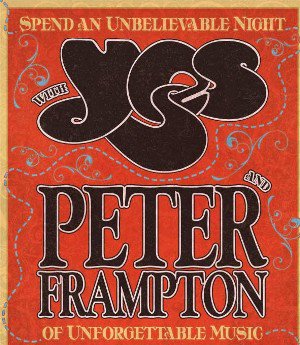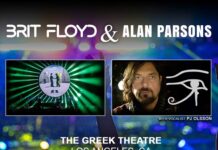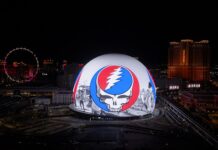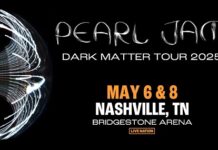Review by Shawn Perry
Of all the lopsided bills I’ve seen, one that has always stuck out in my mind is when Yes and Peter Frampton played at Anaheim Stadium in the summer of 1976. At the time, Frampton had just risen to the top of the heap with Frampton Comes Alive. Well-established Yes was in a transitional period, having just released their prog-heavy three-song opus Relayer and touring with new keyboardist Patrick Moraz. Musically speaking they seemed to be worlds apart; to imagine the two would reassemble 34 years later for another tour was the furthest thing from my, and likely anyone else’s, mind. But who says you can’t repeat history. Well, you can certainly try…
Before the show at the Greek, the tour suffered a major setback when a tent collapsed during the July 6 concert in Concho, Oklahoma, injuring six people and damaging equipment. The tour’s next stop (July 7) in Albuquerque, New Mexico, was cancelled, but, according to Yes bassist Chris Squire, the show at the Greek would go on as scheduled. “Nothing as tremendous as this disaster has ever happened in Yes’ 42-year career. We will be up and running in Los Angeles on Friday.” Looking no worse for wear and tear, Frampton hit the Greek stage a few minutes after 7:00 and the events of the previous days seem to wash away.
Maybe opening with Humble Pie’s “Four-Day Crawl” is a dead giveaway, but it kicked ass just the same. Frampton needs to keep digging out treasures from his Humble Pie days to remind everyone that he was and still is a full-fledge legend. Yeah, the live album made him a household name, but Frampton’s been on a mission these last few years to raise his credibility as a guitarist. With Humble Pie, of course, his guitar playing was piping hot. More recently, his 2006 instrumental album, Fingerprints, provided a much-needed outlet for Frampton’s guitar wizardry.
Nevertheless, it was the songs from Frampton Comes Alive that comprised the bulk of the 100-minute set. After “Show Me The Way,” Frampton talked about another setback, involving the loss of equipment in Nashville during the floods. Calling it “the tour that almost didn’t happen,” he conjured up a woeful spell of “Lines On My Face,” which somehow seemed more convincing at this point in the proceedings. But then the solo came along, and erased away the thin lines between love and hate. Just then, a slew of Yes geeks and assorted MLFs shuffled by, looking for their seats, and you instantly knew it wasn’t 1976 anymore.
It’s too bad Frampton downplayed his latest release, Thank You Mr. Churchill, but even worse that he rolled out the low-key “Restraint,” and later, “Vaudeville Nanna And The Bonjolele” form the album that other, edgier tunes far more suitable in a concert setting. Meanwhile, “Black Hole Sun,” dedicated to Soundgarden’s Chris Cornell, aroused a bemused sense of curiosity from the mostly 40- to 60-something crowd. After that, it was pretty much the staples from his peak years — “Baby I Love Your Way,” “(I’ll Give You) Money” and “Do You Feel Like We Do.” At one point, Frampton’s son Julian jumped in on vocals for a song of his own.
The encore came quicker than expected, and before you knew it, the unmistakable strains of George Harrison’s “While My Guitar Gently Weeps” were snipping at the night air surrounding the Greek. The mane of the 70s may be long gone, but Frampton is still very much alive as a guitarist, singer and performer.
An hour later, the lights were lowered and Stravinsky’s “Firebird Suite” cracked the airwaves as the hunger for Yes intensified. Instead of the requisite “Siberian Khatru” of so many years, the group opens up with “Tempus Fugit,” from the oft-maligned Drama album — the only Yes record to date without Jon Anderson on vocals. There’s a good reason this song is included and it’s all pretty much due to the fact that Anderson is no longer the singer for Yes — not exactly breaking news because Canadian singer Benoît David has had the job since 2008. Nevertheless, with word of a forthcoming album, and David and keyboardist Oliver Wakeman hired on officially as “members” of Yes, the band is pretty much free to do what it wants, including songs from Drama.
They may be a little slower on the draw, but bassist Chris Squire, guitarist Steve Howe and drummer Alan White still know how to swing, and lifting off with “Tempus Fugit” provided the perfect showcase for their chops. David, whose lineage goes back to a Yes tribute band, sounded more like Trevor Horn than Jon Anderson, which made it all the more convincing. Like Horn 30 years earlier, however, he still had a batch songs to tackle that Anderson did sing, and that was what most of diehard fans wrap their discerning ears around.
Anderson was more than just the voice of Yes — his presence conveyed some of the more spiritual qualities of the music. David may have the lung power to sound similar, but he lacks the experience of writing of the songs to fully embrace them in a way that his predecessor can. The Peter Pan pantomime moves aren’t helping matters either.
Fortunately, “professor” Steve Howe remains a thunderbolt of lightening when it comes to laying down classic guitar lines. The cry of the pedal steel on “And You And I” made the tentacles on my ankles go long, before the guitarist switched gears and played the acoustic refrain like the pied piper of Hamelin. He continued to astound the crowd on acoustic when he took the spotlight for “Mood For A Day.”
The band settled into a collective groove on the epic “Close To the Edge.” Wakeman does well to emulate his father’s parts, while at the same time, employing different sounds on some of the passages and solos. Closing the regular set with “Roundabout,” no one could imagine anything out of the ordinary was likely to occur, but a major highlight was just around the corner.
That’s when guitarist Trevor Rabin, the man largely responsible for the band’s revival in the 80s, joined Yes for an encore of their biggest hit, “Owner Of A Lonely Heart.” As expected, Rabin took the lead and Howe took a step back, strumming the major chords, without impeding on the song’s enigmatic framework. To see the two guitarists on stage brought back memories of the 1990 Union tour, which included Howe, Rabin, Squire, White, Bill Bruford, Jon Anderson, Rick Wakeman and Tony Kaye. Chalk that up to something unlikely to ever happen again.
A satisfying helping of “Starship Trooper” finished the night off. This was another one where Anderson brought a certain dynamic. David is undoubtedly a strong and capable singer, but the sense of loss is something resident Yes fans will have to grapple with as the band moves forward. Styx, Foreigner and Grand Funk — they’re doing the same thing without principal members. For Yes, a band that has experienced many transformations and make-overs, it may simply be the end of one era and the start of another. One thing’s for sure though — it certainly isn’t 1976 anymore.




















